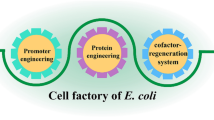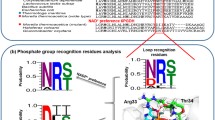Abstract
Glucose 6-phosphate dehydrogenase (G6PDH) is one of the most important dehydrogenases responsible for generating reduced NADPH for anabolism and is also the rate-limiting enzyme in the Entner-Doudoroff pathway. For in vitro biocatalysis, G6PDH must possess both high activity and good thermostability due to requirements of efficient use and low expense of biocatalyst. Here, we used directed evolution to improve thermostability of the highly active G6PDH from Zymomonas mobilis. Four generations of random mutagenesis and Petri-dish-based double-layer screening evolved the thermolabile wild-type enzyme to the thermostable mutant Mut 4-1, which showed a more than 124-fold increase in half-life time (t1/2) at 60 °C, a 3.4 °C increase in melting temperature (T m ), and a 5 °C increase in optimal temperature (Topt), without compromising the specific activity. In addition, the thermostable mutant was conducted to generate hydrogen from maltodextrin via in vitro synthetic biosystems (ivSB), gaining a more than 8-fold improvement of productivity rate with 76% of theoretical yield at 60 °C. Thus, the engineered G6PDH has been shown to effectively regenerate NADPH at high temperatures and will be applicable for NAD(P)H regeneration in numerous in vitro biocatalysis applications.






Similar content being viewed by others
References
Chandrayan SK, Wu C-H, McTernan PM, Adams MWW (2015) High yield purification of a tagged cytoplasmic [NiFe]-hydrogenase and a catalytically-active nickel-free intermediate form. Protein Expr Purif 107:90–94. https://doi.org/10.1016/j.pep.2014.10.018
Charoensuk K, Sakurada T, Tokiyama A, Murata M, Kosaka T, Thanonkeo P, Yamada M (2017) Thermotolerant genes essential for survival at a critical high temperature in thermotolerant ethanologenic Zymomonas mobilis TISTR 548. Biotechnol Biofuels 10(1):204. https://doi.org/10.1186/s13068-017-0891-0
Conway T (1992) The Entner-Doudoroff pathway: history, physiology and molecular biology. FEMS Microbiol Rev 9(1):1–27. https://doi.org/10.1111/j.1574-6968.1992.tb05822.x
Daniel RM, Dines M, Petach HH (1996) The denaturation and degradation of stable enzymes at high temperatures. Biochem J 317(1):1–11. https://doi.org/10.1042/bj3170001
de Abreu M, Alvaro-Benito M, Sanz-Aparicio J, Plou FJ, Fernandez-Lobato M, Alcalde M (2013) Synthesis of 6-Kestose using an efficient β-fructofuranosidase engineered by directed evolution. Adv Synth Catal 355(9):1698–1702. https://doi.org/10.1002/adsc.201200769
Fuentealba M, Munoz R, Maturana P, Krapp A, Cabrera R (2016) Determinants of cofactor specificity for the glucose-6-phosphate dehydrogenase from Escherichia coli: simulation, kinetics and evolutionary studies. PLoS One 11(3):e0152403. https://doi.org/10.1371/journal.pone.0152403
Garcia-Arellano H, Valderrama B, Saab-Rincon G, Vazquez-Duhalt R (2002) High temperature biocatalysis by chemically modified cytochrome C. Bioconjug Chem 13:1336–1344. https://doi.org/10.1021/bc025561p
Giver L, Gershenson A, Freskgard P-O, Arnold FH (1998) Directed evolution of a thermostable esterase. Proc Natl Acad Sci U S A 95(22):12809–12813. https://doi.org/10.1073/pnas.95.22.12809
Gomez-Manzo S, Terron-Hernandez J, De la Mora-De la Mora I, Gonzalez-Valdez A, Marcial-Quino J, Garcia-Torres I, Vanoye-Carlo A, Lopez-Velazquez G, Hernandez-Alcantara G, Oria-Hernandez J, Reyes-Vivas H, Enriquez-Flores S (2014) The stability of G6PD is affected by mutations with different clinical phenotypes. Int J Mol Sci 15(11):21179–21201. https://doi.org/10.3390/ijms151121179
Hansen T, Schlichting B, Schönheit P (2002) Glucose-6-phosphate dehydrogenase from the hyperthermophilic bacterium Thermotoga maritima: expression of the g6pd gene and characterization of an extremely thermophilic enzyme. FEMS Microbiol Lett 216(2):249–253
Hasmann FA, Gurpilhares DB, Roberto IC, Converti A, Pessoa A (2007) New combined kinetic and thermodynamic approach to model glucose-6-phosphate dehydrogenase activity and stability. Enzym Microb Technol 40(4):849–858. https://doi.org/10.1016/j.enzmictec.2006.06.017
He MX, Wu B, Qin H, Ruan ZY, Tan FR, Wang JL, Shui ZX, Dai LC, Zhu QL, Pan K, Tang XY, Wang WG, Hu QC (2014) Zymomonas mobilis: a novel platform for future biorefineries. Biotechnol Biofuels 7(1):101. https://doi.org/10.1186/1754-6834-7-101
Huang R, Chen H, Zhong C, Kim JE, Zhang Y-HP (2016) High-throughput screening of coenzyme preference change of thermophilic 6-phosphogluconate dehydrogenase from NADP+ to NAD+. Sci Rep 6(1):32644. https://doi.org/10.1038/srep32644
Iyer RB, Wang J, Bachas LG (2002) Cloning, expression, and characterization of the gsdA gene encoding thermophilic glucose-6-phosphate dehydrogenase from Aquifex aeolicus. Extremophiles 6(4):283–289
Johannes TW, Woodyer RD, Zhao H (2005) Directed evolution of a thermostable phosphite dehydrogenase for NAD(P)H regeneration. Appl Environ Microbiol 71(10):5728–5734. https://doi.org/10.1128/AEM.71.10.5728-5734.2005
Kanji MI, Toews ML, Carper WR (1976) A kinetic study of glucose-6-phosphate dehydrogenase. J Biol Chem 251(8):2258–2262
Kim EJ, Wu CH, Adams MW, Zhang Y-HP (2016) Exceptionally high rates of biological hydrogen production by biomimetic in vitro synthetic enzymatic pathways. Chem Eur J 22(45):16047–16051. https://doi.org/10.1002/chem.201604197
Kim J-E, Kim E-J, Chen H, Wu C-H, Adams MW, Zhang Y-HP (2017) Advanced water splitting for green hydrogen gas production through complete oxidation of starch by in vitro metabolic engineering. Metab Eng 44:246–252. https://doi.org/10.1016/j.ymben.2017.09.015
Kusumoto M, Kishimoto T, Nishiya Y (2010) Improvement of thermal stability of Leuconostoc pseudomesenteroides glucose-6-phosphate dehydrogenase. J Anal Bio-Sci 33(4):397–400
Lee WT, Levy HR (1992) Lysine-21 of Leuconostoc mesenteroides glucose 6-phosphate dehydrogenase participates in substrate binding through charge–charge interaction. Protein Sci 1(3):329–334. https://doi.org/10.1002/pro.5560010304
Li Z, Jiang N, Yang K, Zheng J (2016) Cloning, expression, and characterization of a thermostable glucose-6-phosphate dehydrogenase from Thermoanaerobacter tengcongensis. Extremophiles 20(2):149–156. https://doi.org/10.1007/s00792-016-0808-z
Li G, Maria-Solano MA, Romero-Rivera A, Osuna S, Reetz MT (2017) Inducing high activity of a thermophilic enzyme at ambient temperatures by directed evolution. Chem Commun 53(68):9454–9457. https://doi.org/10.1039/C7CC05377K
Liu W, Hong J, Bevan DR, Zhang Y-HP (2009) Fast identification of thermostable beta-glucosidase mutants on cellobiose by a novel combinatorial selection/screening approach. Biotechnol Bioeng 103(6):1087–1094. https://doi.org/10.1002/bit.22340
Madhusudan Makwana K, Mahalakshmi R (2015) Implications of aromatic-aromatic interactions: from protein structures to peptide models. Protein Sci 24(12):1920–1933. https://doi.org/10.1002/pro.2814
Mayer KM, Arnold FH (2002) A colorimetric assay to quantify dehydrogenase activity in crude cell lysates. J Biomol Screen 7(2):135–140. https://doi.org/10.1177/108705710200700206
McLachlan MJ, Johannes TW, Zhao H (2008) Further improvement of phosphite dehydrogenase thermostability by saturation mutagenesis. Biotechnol Bioeng 99(2):268–274. https://doi.org/10.1002/bit.21546
Mercaldi GF, Dawson A, Hunter WN, Cordeiro AT (2016) The structure of a Trypanosoma cruzi glucose-6-phosphate dehydrogenase reveals differences from the mammalian enzyme. FEBS Lett 590(16):2776–2786. https://doi.org/10.1002/1873-3468.12276
Nomura T, Kamada R, Ito I, Chuman Y, Shimohigashi Y, Sakaguchi K (2009) Oxidation of methionine residue at hydrophobic core destabilizes p53 tetrameric structure. Biopolymers 91(1):78–84. https://doi.org/10.1002/bip.21084
Rendon JL, Del Arenal IP, Guevara-Flores A, Mendoza-Hernandez G, Pardo JP (2008) Glucose 6-phosphate dehydrogenase from larval Taenia crassiceps (cysticerci): purification and properties. Parasitol Res 102:1351–1357. https://doi.org/10.1007/s00436-008-0917-4
Rogers TA, Bommarius AS (2010) Utilizing simple biochemical measurements to predict lifetime output of biocatalysts in continuous isothermal processes. Chem Eng Sci 65(6):2118–2124. https://doi.org/10.1016/j.ces.2009.12.005
Rollin JA, del Campo JM, Myung S, Sun F, You C, Bakovic A, Castro R, Chandrayan SK, Wu C-H, Adams MWW, Senger RS, Zhang Y-HP (2015) High-yield hydrogen production from biomass by in vitro metabolic engineering: mixed sugars coutilization and kinetic modeling. Proc Natl Acad Sci U S A 112(16):4964–4969. https://doi.org/10.1073/pnas.1417719112
Roth T, Beer B, Pick A, Sieber V (2017) Thermostabilization of the uronate dehydrogenase from Agrobacterium tumefaciens by semi-rational design. AMB Express 7(1):103. https://doi.org/10.1186/s13568-017-0405-2
Scopes RK (1997) Allosteric control of Zymomonas mobilis glucose-6-phosphate dehydrogenase by phosphoenolpyruvate. Biochem J 326(3):731–735. https://doi.org/10.1042/bj3260731
Scopes RK, Testolin V, Stoter A, Griffiths-Smith K, Algar EM (1985) Simultaneous purification and characterization of glucokinase, fructokinase and glucose-6-phosphate dehydrogenase from Zymomonas mobilis. Biochem J 228(3):627–634
Sekar BS, Seol E, Park S (2017) Co-production of hydrogen and ethanol from glucose in Escherichia coli by activation of pentose-phosphate pathway through deletion of phosphoglucose isomerase (pgi) and overexpression of glucose-6-phosphate dehydrogenase (zwf) and 6-phosphogluconate dehydrogenase (gnd). Biotechnol Biofuels 10(1):85. https://doi.org/10.1186/s13068-017-0768-2
Wang Y, Huang W, Sathitsuksanoh N, Zhu Z, Zhang Y-HP (2011) Biohydrogenation from biomass sugar mediated by in vitro synthetic enzymatic pathways. Chem Biol 18(3):372–380. https://doi.org/10.1016/j.chembiol.2010.12.019
Wu I, Arnold FH (2013) Engineered thermostable fungal Cel6A and Cel7A cellobiohydrolases hydrolyze cellulose efficiently at elevated temperatures. Biotechnol Bioeng 110(7):1874–1883. https://doi.org/10.1002/bit.24864
Xu B-L, Dai M, Chen Y, Meng D, Wang Y, Fang N, Tang X-F, Tang B (2015) Improving the thermostability and activity of a thermophilic subtilase by incorporating structural elements of its psychrophilic counterpart. Appl Environ Microbiol 81(18):6302–6313. https://doi.org/10.1128/AEM.01478-15
Yang S, Fei Q, Zhang Y, Contreras LM, Utturkar SM, Brown SD, Himmel ME, Zhang M (2016) Zymomonas mobilis as a model system for production of biofuels and biochemicals. Microb Biotechnol 9(6):699–717. https://doi.org/10.1111/1751-7915.12408
You L, Arnold FH (1996) Directed evolution of subtilisin E in Bacillus subtilis to enhance total activity in aqueous dimethylformamide. Protein Eng 9(1):77–83. https://doi.org/10.1093/protein/9.1.77
You C, Zhang Y-HP (2012) Easy preparation of a large-size random gene mutagenesis library in Escherichia coli. Anal Biochem 428(1):7–12. https://doi.org/10.1016/j.ab.2012.05.022
You C, Shi T, Li Y, Han P, Zhou X, Zhang Y-HP (2017) An in vitro synthetic biology platform for the industrial biomanufacturing of myo-inositol from starch. Biotechnol Bioeng 114(8):1855–1864. https://doi.org/10.1002/bit.26314
Zhang Y-HP, Sun J, Zhong J-J (2010) Biofuel production by in vitro synthetic enzymatic pathway biotransformation. Curr Opin Biotechnol 21(5):663–669. https://doi.org/10.1016/j.copbio.2010.05.005
Zhang X-F, Yang G-Y, Zhang Y, Xie Y, Withers SG, Feng Y (2016) A general and efficient strategy for generating the stable enzymes. Sci Rep 6(1):33797. https://doi.org/10.1038/srep33797
Zhao X, Shi F, Zhan W (2015) Overexpression of ZWF1 and POS5 improves carotenoid biosynthesis in recombinant Saccharomyces cerevisiae. Lett Appl Microbiol 61(4):354–360. https://doi.org/10.1111/lam.12463
Zheng M, Chen K, Wang R-F, Li H, Li C-X, Xu J-H (2017) Engineering 7β-hydroxysteroid dehydrogenase for enhanced ursodeoxycholic acid production by multi-objective directed evolution. J Agric Food Chem 65(6):1178–1185. https://doi.org/10.1021/acs.jafc.6b05428
Zhu Z, Zhang Y-HP (2017) In vitro metabolic engineering of bioelectricity generation by the complete oxidation of glucose. Metab Eng 39:110–116. https://doi.org/10.1016/j.ymben.2016.11.002
Zhu Z, Tam TK, Sun F, You C, Zhang Y-HP (2014) A high-energy-density sugar biobattery based on a synthetic enzymatic pathway. Nat Commun 5:3026. https://doi.org/10.1038/ncomms4026
Acknowledgments
This project could not have been carried out without the support of the Biological Systems Engineering Department, Virginia Polytechnic Institute and State University, Blacksburg, Virginia, USA and Tianjin Institute of Industrial Biotechnology, Chinese Academy of Sciences. This study was supported by the Department of Energy, Office of Energy Efficiency and Renewable Energy, Fuel Cell Technologies Office under Award Number DE-EE0006968. The manuscript was edited by Ryan S. Senger.
Author information
Authors and Affiliations
Corresponding authors
Ethics declarations
Conflict of interest
The authors declare that they have no competing interests.
Ethical approval
This article does not contain any studies with human participants or animals performed by any of the authors.
Rights and permissions
About this article
Cite this article
Huang, R., Chen, H., Zhou, W. et al. Engineering a thermostable highly active glucose 6-phosphate dehydrogenase and its application to hydrogen production in vitro. Appl Microbiol Biotechnol 102, 3203–3215 (2018). https://doi.org/10.1007/s00253-018-8798-7
Received:
Revised:
Accepted:
Published:
Issue Date:
DOI: https://doi.org/10.1007/s00253-018-8798-7




